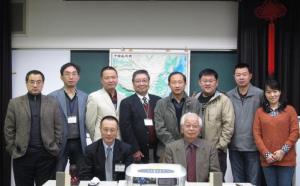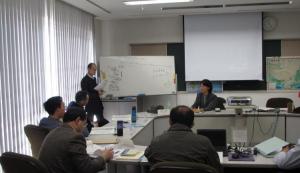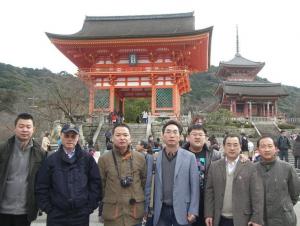Home > Workshop and Training > IN JAPAN > Fiscal Year 2011 > FY2011 JICA Training Course Held on Industrial Environment Manager System in China
Main content starts here.
Update:March 15, 2012
FY2011 JICA Training Course Held on Industrial Environment Manager System in China
With support of the Japan International Cooperation Agency (JICA), China’s Ministry of Environmental Protection, an equivalent of Japan’s Ministry of the Environment, has been setting up the Industrial Environment Manager System since 2006, which is modeled on Japan’s Pollution Control Manager System. The Industrial Environment Manager System is designed for companies to work voluntarily on environmental management. In 2008, the basic design of the system was completed, and since then the Chinese ministry has been gearing up for the enforcement of the system by clarifying the details of the basic design, introducing a law that designates the Industrial Environment Manager as a national vocational qualification, raising awareness of the system among enterprises and local government bodies, and getting educational materials ready for the qualification exam. As part of the preparations to introduce the system, this course provided an opportunity for working-level officials from the provincial industrial environment monitoring bureaus, who are responsible for running the system, to learn about the historical experience of Japan with pollution, environmental management practiced by Japanese companies and national and local governments, and the operation of pollution control facilities. The officials will use this experience here at ICETT after returning home.


The Chinese participants came to Japan on February 21 and stayed until March 1. They were eight officials from the Ministry of Environmental Protection, provincial governments of Hunan, Jilin, Shanxi, Zhejiang, Jiangsu, and Shandong, and the municipal government of Chongqing.
The participants learned about Japanese legal systems designed to prevent air and water pollution and properly dispose of waste while visiting pollution prevention and waste disposal facilities. They were also given an opportunity to exchange opinions and views with workers, engaged in environmental management at a petrochemical complex in Yokkaichi, regarding the situation there. Aside from the course activities themselves, they traveled to Kyoto by a chartered bus on holidays to visit two famous Buddhist temples and enjoy eating beautifully presented Japanese cuisine. It was very interesting that some of them mentioned the city is built on a grid pattern just as the ancient Chinese capitals Chang’an and Luoyang were. This reminded us of a phrase, often used to refer to the relationships between Japan and China, that the two countries, separated by only a narrow strip of water, have close ties with each other.
We highly expect that a blue and clear sky will be restored to every part of China by introducing the Industrial Environment Manager System. We would like to express our sincere gratitude to government officials and company staff members for their cooperation in the course. (Taniguchi)








